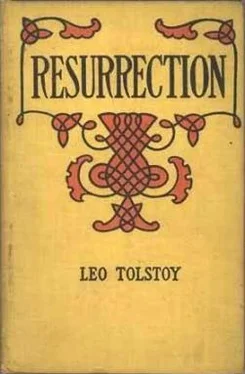Leo Tolstoy - Resurrection
Здесь есть возможность читать онлайн «Leo Tolstoy - Resurrection» весь текст электронной книги совершенно бесплатно (целиком полную версию без сокращений). В некоторых случаях можно слушать аудио, скачать через торрент в формате fb2 и присутствует краткое содержание. Жанр: Русская классическая проза, на английском языке. Описание произведения, (предисловие) а так же отзывы посетителей доступны на портале библиотеки ЛибКат.
- Название:Resurrection
- Автор:
- Жанр:
- Год:неизвестен
- ISBN:нет данных
- Рейтинг книги:4 / 5. Голосов: 1
-
Избранное:Добавить в избранное
- Отзывы:
-
Ваша оценка:
- 80
- 1
- 2
- 3
- 4
- 5
Resurrection: краткое содержание, описание и аннотация
Предлагаем к чтению аннотацию, описание, краткое содержание или предисловие (зависит от того, что написал сам автор книги «Resurrection»). Если вы не нашли необходимую информацию о книге — напишите в комментариях, мы постараемся отыскать её.
Resurrection — читать онлайн бесплатно полную книгу (весь текст) целиком
Ниже представлен текст книги, разбитый по страницам. Система сохранения места последней прочитанной страницы, позволяет с удобством читать онлайн бесплатно книгу «Resurrection», без необходимости каждый раз заново искать на чём Вы остановились. Поставьте закладку, и сможете в любой момент перейти на страницу, на которой закончили чтение.
Интервал:
Закладка:
“Just as if a problem had been set to find the best, the surest means of depraving the greatest number of persons,” thought Nekhludoff, while investigating the deeds that were being done in the prisons and halting stations. Every year hundreds of thousands were brought to the highest pitch of depravity, and when completely depraved they were set free to carry the depravity they had caught in prison among the people. In the prisons of Tamen, Ekaterinburg, Tomsk and at the halting stations Nekhludoff saw how successfully the object society seemed to have set itself was attained.
Ordinary, simple men with a conception of the demands of the social and Christian Russian peasant morality lost this conception, and found a new one, founded chiefly on the idea that any outrage or violence was justifiable if it seemed profitable. After living in a prison those people became conscious with the whole of their being that, judging by what was happening to themselves, all the moral laws, the respect and the sympathy for others which church and the moral teachers preach, was really set aside, and that, therefore, they, too, need not keep the laws. Nekhludoff noticed the effects of prison life on all the convicts he knew—on Fedoroff, on Makar, and even on Taras, who, after two months among the convicts, struck Nekhludoff by the want of morality in his arguments. Nekhludoff found out during his journey how tramps, escaping into the marshes, persuade a comrade to escape with them, and then kill him and feed on his flesh. (He saw a living man who was accused of this and acknowledged the fact.) And the most terrible part was that this was not a solitary, but a recurring case.
Only by a special cultivation of vice, such as was perpetrated in these establishments, could a Russian be brought to the state of this tramp, who excelled Nietzsche’s newest teaching, and held that everything was possible and nothing forbidden, and who spread this teaching first among the convicts and then among the people in general.
The only explanation of all that was being done was the wish to put a stop to crime by fear, by correction, by lawful vengeance as it was written in the books. But in reality nothing in the least resembling any of these results came to pass. Instead of vice being put a stop to, it only spread further; instead of being frightened, the criminals were encouraged (many a tramp returned to prison of his own free will). Instead of being corrected, every kind of vice was systematically instilled, while the desire for vengeance did not weaken by the measures of the government, but was bred in the people who had none of it.
“Then why is it done?” Nekhludoff asked himself, but could find no answer. And what seemed most surprising was that all this was not being done accidentally, not by mistake, not once, but that it had continued for centuries, with this difference only, that at first the people’s nostrils used to be torn and their ears cut off; then they were branded, and now they were manacled and transported by steam instead of on the old carts. The arguments brought forward by those in government service, who said that the things which aroused his indignation were simply due to the imperfect arrangements of the places of confinement, and that they could all be put to rights if prisons of a modern type were built, did not satisfy Nekhludoff, because he knew that what revolted him was not the consequence of a better or worse arrangement of the prisons. He had read of model prisons with electric bells, of executions by electricity, recommended by Tard; but this refined kind of violence revolted him even more.
But what revolted Nekhludoff most was that there were men in the law courts and in the ministry who received large salaries, taken from the people, for referring to books written by men like themselves and with like motives, and sorting actions that violated laws made by themselves according to different statutes; and, in obedience to these statutes, sending those guilty of such actions to places where they were completely at the mercy of cruel, hardened inspectors, jailers, convoy soldiers, where millions of them perished body and soul.
Now that he had a closer knowledge of prisons, Nekhludoff found out that all those vices which developed among the prisoners—drunkenness, gambling, cruelty, and all these terrible crimes, even cannibalism—were not casual, or due to degeneration or to the existence of monstrosities of the criminal type, as science, going hand in hand with the government, explained it, but an unavoidable consequence of the incomprehensible delusion that men may punish one another. Nekhludoff saw that cannibalism did not commence in the marshes, but in the ministry. He saw that his brother-in-law, for example, and, in fact, all the lawyers and officials, from the usher to the minister, do not care in the least for justice or the good of the people about whom they spoke, but only for the roubles they were paid for doing the things that were the source whence all this degradation and suffering flowed. This was quite evident.
“Can it be, then, that all this is done simply through misapprehension? Could it not be managed that all these officials should have their salaries secured to them, and a premium paid them, besides, so that they should leave off, doing all that they were doing now?” Nekhludoff thought, and in spite of the fleas, that seemed to spring up round him like water from a fountain whenever he moved, he fell fast asleep.
XX
The journey resumed.
The carters had left the inn long before Nekhludoff awoke. The landlady had had her tea, and came in wiping her fat, perspiring neck with her handkerchief, and said that a soldier had brought a note from the halting station. The note was from Mary Pavlovna. She wrote that Kryltzoff’s attack was more serious than they had imagined. “We wished him to be left behind and to remain with him, but this has not been allowed, so that we shall take him on; but we fear the worst. Please arrange so that if he should be left in the next town, one of us might remain with him. If in order to get the permission to stay I should be obliged to get married to him, I am of course ready to do so.”
Nekhludoff sent the young labourer to the post station to order horses and began packing up hurriedly. Before he had drunk his second tumbler of tea the three-horsed postcart drove up to the porch with ringing bells, the wheels rattling on the frozen mud as on stones. Nekhludoff paid the fat-necked landlady, hurried out and got into the cart, and gave orders to the driver to go on as fast as possible, so as to overtake the gang. Just past the gates of the commune pasture ground they did overtake the carts, loaded with sacks and the sick prisoners, as they rattled over the frozen mud, that was just beginning to be rolled smooth by the wheels (the officer was not there, he had gone in advance). The soldiers, who had evidently been drinking, followed by the side of the road, chatting merrily. There were a great many carts. In each of the first carts sat six invalid criminal convicts, close packed. On each of the last two were three political prisoners. Novodvoroff, Grabetz and Kondratieff sat on one, Rintzeva, Nabatoff and the woman to whom Mary Pavlovna had given up her own place on the other, and on one of the carts lay Kryltzoff on a heap of hay, with a pillow under his head, and Mary Pavlovna sat by him on the edge of the cart. Nekhludoff ordered his driver to stop, got out and went up to Kryltzoff. One of the tipsy soldiers waved his hand towards Nekhludoff, but he paid no attention and started walking by Kryltzoff’s side, holding on to the side of the cart with his hand. Dressed in a sheepskin coat, with a fur cap on his head and his mouth bound up with a handkerchief, he seemed paler and thinner than ever. His beautiful eyes looked very large and brilliant. Shaken from side to side by the jottings of the cart, he lay with his eyes fixed on Nekhludoff; but when asked about his health, he only closed his eyes and angrily shook his head. All his energy seemed to be needed in order to bear the jolting of the cart. Mary Pavlovna was on the other side. She exchanged a significant glance with Nekhludoff, which expressed all her anxiety about Kryltzoff’s state, and then began to talk at once in a cheerful manner.
Читать дальшеИнтервал:
Закладка:
Похожие книги на «Resurrection»
Представляем Вашему вниманию похожие книги на «Resurrection» списком для выбора. Мы отобрали схожую по названию и смыслу литературу в надежде предоставить читателям больше вариантов отыскать новые, интересные, ещё непрочитанные произведения.
Обсуждение, отзывы о книге «Resurrection» и просто собственные мнения читателей. Оставьте ваши комментарии, напишите, что Вы думаете о произведении, его смысле или главных героях. Укажите что конкретно понравилось, а что нет, и почему Вы так считаете.












